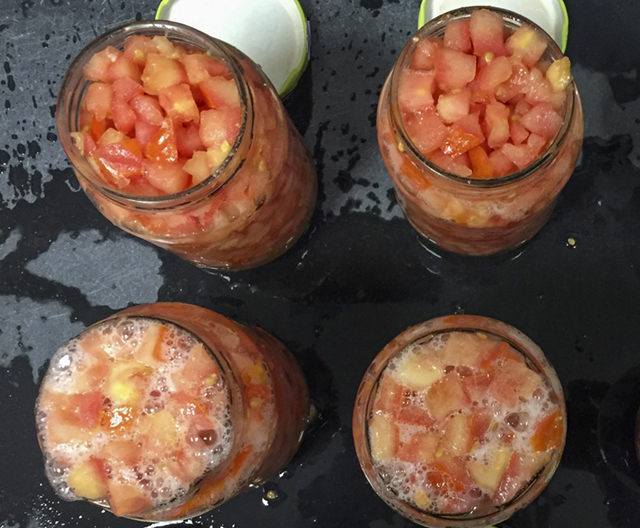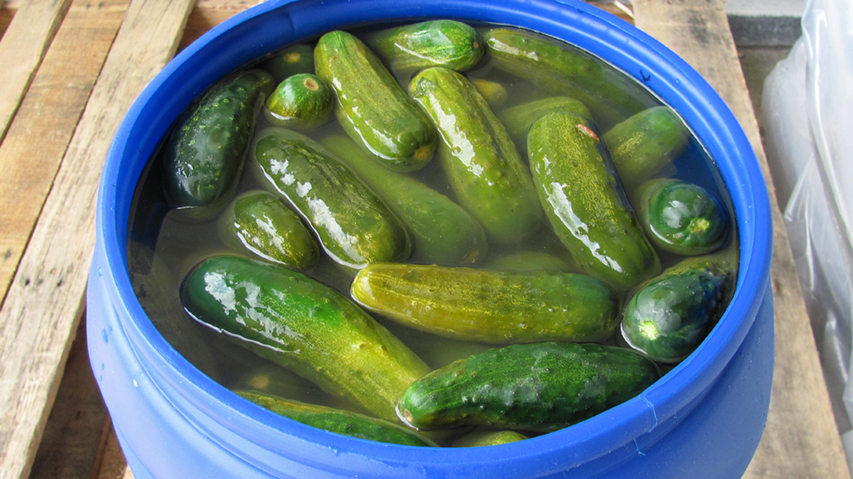
The Health Benefits of Fermented Vegetables
 |
Dr. Ilenys Perez-Diaz is a Microbiologist with the Food Science and Market Quality and Handling Research Unit in Raleigh, NC. Her work involves research into microbes present during the fermentation and acidification of vegetables. |
Welcome Dr. Perez-Diaz to Under the Microscope:
UM – As a microbiologist, how does your work connect to processed vegetables? What types of processes do these vegetables go through?
IP – There is a variety of microbes naturally present in fresh vegetables. The uncontrolled growth of such microbes in vegetables results in their decomposition and lack of appeal to consumers. We can control the growth of microbes in vegetables through the fermentation process, popularly known as pickles in the U.S.
I study the indigenous microorganisms in fresh vegetables and develop processes that produce fermented or acidified vegetables with prolonged shelf lives, enhanced flavor, and substantial nutritional content.
UM – What is the difference between fermentation and pickling?
IP – While these terms are used interchangeably in the USA, they are actually different. Technically, fermentation refers to the preservation of vegetables by converting the indigenous sugars to organic acids and increasing acidity. Pickling refers to vegetables that are acidified, primarily with vinegar, to extend their shelf-life.
 Preservation of surplus tomatoes by sodium chloride free acidification (top) and fermentation (bottom). (Fernando Montero)
Preservation of surplus tomatoes by sodium chloride free acidification (top) and fermentation (bottom). (Fernando Montero)
UM – Americans are usually not too familiar with fermented foods, but they are popular in other parts of the world. How safe are fermented foods?
IP – Fermented vegetables enjoy a strong record of safety; there are almost no outbreaks associated with them. Fermented vegetables are safe for human consumption as long as the microbial growth is controlled, and an appropriate pH level is maintained during storage.
UM – What are the benefits of fermenting or pickling your food?
IP – The main benefit of fermenting or acidifying vegetables is the extension of shelf-life. In certain vegetable fermentations, depending on the microbes, there can be enhanced levels of antioxidant or vitamin content.
However, we must not forget that the main metabolic products in a fermentation are lactic acid and acetic acid, which are building blocks of butyric acid and propionic acid. Such organic acids serve as energy sources for the gut lining, so it's theoretically possible that fermented foods enhance human gut health. Lactic acid has also been associated with enhanced endurance in athletes who consume fermented vegetables and the juices.
 Preservation of cucumbers via acidification in a reduced acid and salt solution. (Ilenys Perez-Diaz)
Preservation of cucumbers via acidification in a reduced acid and salt solution. (Ilenys Perez-Diaz)
UM – Does the degree of fermentation impact the health benefits of a vegetable?
IP – This is a very interesting question. It is unknown to what extent fermented vegetables may enhance human health. However, we do know that butyric acid, the main energy source for the gut tissue lining, can be produced in some vegetable fermentations. Thus, it is of interest to further study the impact of fermented vegetables in the human gut health.
UM – We tend to think of pickled or fermented foods as extremely salty and briny. I understand that you and your team have worked to reduce sodium chloride in processed vegetables – please explain the process and how this can help consumers?
IP – Traditionally, the production of fermented vegetables has depended on the use of 6 to 10% sodium chloride salt in brines to control microbial growth. Salt makes it difficult for most microbes to grow on the vegetable and spoil it. Additionally, salt promotes the growth of bacteria that produce lactic acid, which leads to the desired conversion of sugars to acids.
Although this is a natural process, it can also result in environmental pollution if done on an industrial scale. The brining solution used to turn cucumbers into pickles is high in acidity and salt, which can harm the environment if disposed of improperly. My team and I have managed to replace most of the sodium chloride (table salt) in the brine with calcium chloride. Calcium chloride may improve soil quality and stimulate plant growth.
This new brining solution does not alter the taste or texture of the pickle, but it contains significantly less sodium – something many consumers may appreciate for health reasons.
UM – Recently, people have been interested in consuming probiotic or prebiotic foods like fermented vegetables. Please explain how these types of foods may promote gut health.
IP – Fermented vegetables not only serve as an environment for potentially beneficial microbes to grow, but they also naturally harbor indigestible dietary fibers that feed the gut microbiome. In theory, there is an advantage in using beneficial microbes in fermented foods that are customized to the gut's natural pH acidity and environment. However, it is difficult to do so due to the level of microbial diversity within each individual's gut, and also the complexity of microbial interactions within the human body. – by Georgia Jiang, ARS Office of Communications.
